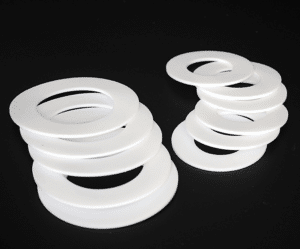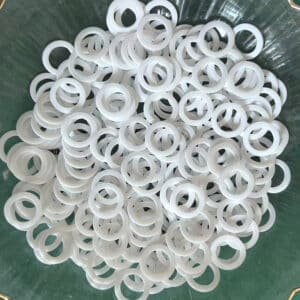Need sealing performance across high heat or aggressive chemicals? Choosing between Silicone O-Rings and FKM O-Rings can define your system’s reliability.
FKM O-rings excel in chemical and oil resistance, while Silicone O-rings are best in extreme heat and cold.
Here’s how I compare them and choose the right fit every time.
What is the difference between Silicone and FKM O-Rings?
Silicone is flexible and food-safe; FKM is robust and chemical-resistant.
| Property | Silicone O-Ring | FKM O-Ring |
|---|---|---|
| Temperature Range | -50°C to 250°C | -20°C to 200°C |
| Chemical Resistance | UV, ozone, limited fluids | Fuels, oils, solvents |
| Application | Food, medical, low-stress | Fuel, automotive, dynamic |
| Cost | Lower | Higher |
Silicone O-Rings Details | Explore FKM Options
Which O-Ring performs better under temperature extremes?
If you’re sealing in extreme cold or static high heat, go for silicone. For high-temp chemicals, choose FKM.
| Material | Lowest Temp | Highest Temp (Typical) |
|---|---|---|
| Silicone | -50°C | 250°C (300°C additives) |
| FKM | -20°C | 200°C (up to 300°C) |
FKM for high-heat chemical sealing
When should I use Silicone or FKM O-Rings?
Use Silicone O-Rings in:
- Food-grade or sterile systems
- Cold storage
- Low-pressure static sealing
Use FKM O-Rings in:
- Automotive fuel lines
- Hydraulic systems
- Oil, chemical, and acid environments
Compare EPDM vs FKM for chemical sealing
Which O-Ring lasts longer and offers better ROI?
| Metric | Silicone O-Rings | FKM O-Rings |
|---|---|---|
| Cost | Lower upfront | Higher upfront |
| Lifespan | Moderate | Long-lasting |
| Maintenance Cycle | Frequent | Minimal |
Silicone is great for short-term or clean use. FKM pays off in aggressive systems.
What do users say about Silicone vs FKM O-Rings?
- “Silicone was perfect for our autoclave seals.” – Food OEM
- “FKM cut our chemical leakage incidents by half.” – Oil refinery manager
Use our O-Ring Maker Tool for custom needs.
How do I choose between Silicone and FKM O-Rings?
Follow this decision path:
- Exposure to oil/fuel? → Use FKM
- High heat, no fluids? → Use Silicone
- Dynamic movement? → Use FKM
- FDA-grade or static? → Use Silicone
📞 Still unsure? Contact us at [email protected]
Conclusion
Choose Silicone O-Rings for heat, cold, or food-grade sealing. Use FKM when oil, fuel, or chemicals are involved.
Request custom O-Rings today
📩 Email: [email protected]
📞 WhatsApp: +86 17622979498
Related post



